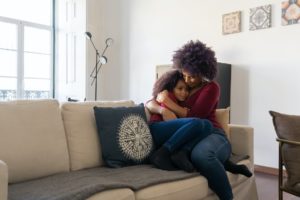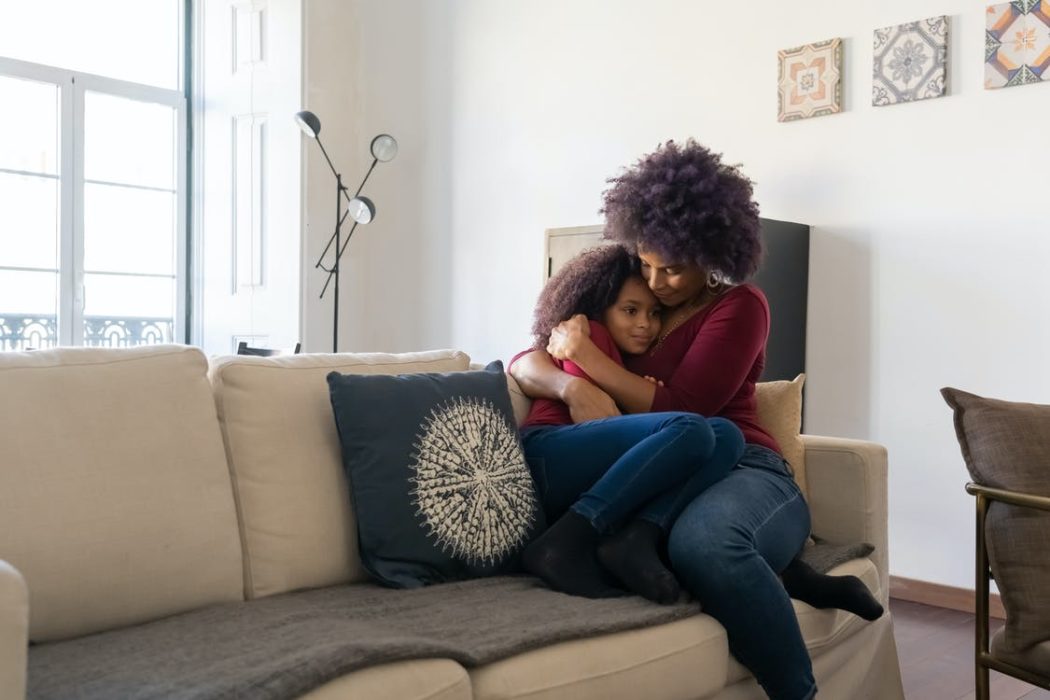 Children experience sexual abuse at alarming rates — 1 in 5 girls and 1 in 20 boys — which is terrifying enough. But then, add in the fact they rarely (if ever) know the right words to describe what happened to them. They probably haven’t heard of the term “sexual abuse” or even the specific body parts that were violated. They may also be scared to speak up because of a threat their abuser made.
Children experience sexual abuse at alarming rates — 1 in 5 girls and 1 in 20 boys — which is terrifying enough. But then, add in the fact they rarely (if ever) know the right words to describe what happened to them. They probably haven’t heard of the term “sexual abuse” or even the specific body parts that were violated. They may also be scared to speak up because of a threat their abuser made.
For these reasons, one of the most important things we can do for Child Abuse Prevention Month is know the signs that kids are able to share — and how to support them after.
How to Notice Signs of Childhood Sexual Abuse
Some signs are more obvious than others. Some may seem “normal” but are actually because of abuse. Here’s what to look out for:
1. Pay attention to their behavior
Children may not be able to use words, so watch how they act and change. “Children who are abused but who don’t have the correct words will often tell adults using their behavior,” said Elizabeth Jeglic, Ph.D., a professor of psychology and co-author of “Protecting Your Child from Sexual Abuse: What You Need to Know to Keep Your Kids Safe.” She explained you may observe behavior regression, like them having accidents in the bed, or soothing behaviors, such as sucking their thumb. Additionally, children may seem more afraid to be around a certain person, especially alone, and may act more withdrawn than usual.
2. Be aware of potential medical issues
Children may also have physical problems because of the abuse, such as urinary tract infections, STDs, pain during urination and bowel movements, and headaches, according to Kristine Ovsepian, a certified hypnotherapist, life coach, and author of “Living through Choice.” If your child has any of these symptoms, seeing a pediatrician (and sharing your concerns about the potential abuse) is crucial.
3. Listen carefully to what they do share
While they may not know the exact terminology, kids may have somewhat of an understanding of what’s happening to them and their bodies. For example, they may use slang they heard, such as someone “ate their cookie” (which, in this case, means oral rape).
“It’s important to listen for the words they do know, and when they speak them in a painful or confusing context, it’s time for a deeper conversation,” Ovsepian said.
The Importance of Teaching Children Anatomical Terms
This topic brings up how crucial it is to talk to children about their bodies, using anatomically correct words, during “the sex talk.” Imagine how much easier and quicker you could find out about the abuse if they had the right words to explain it to you.
“Parents should teach their children correct anatomical terms for their body parts as soon as they start understanding the language,” Jeglic said. “These words are only shameful because we perceive them to be.”
“When you’re teaching them about knees, toes, and elbows, that is also the best time to teach them about testicles, [the] anus, and [the] vulva,” Ovsepian added.
Studies back this up. “One study… reported that if a child knew the correct anatomical names for their body parts, [perpetrators] would be less likely to abuse them since the child would be more likely to have an open relationship with their parents and thus would be more likely to report,” Jeglic shared.
Knowing the right names can also foster positive body image and lessen discomfort. “Nicknames for their genitals can make them feel that there’s something bad or shameful about them,” Ovsepian said. “[Teaching them the anatomical terms] also equips them with a greater understanding of their bodies and sexual development.”
The more comfortable a child is, the more likely they are to open up. “If children feel that parents are comfortable talking about issues related to healthy sexuality, they will be more likely to report behavior that makes them feel uncomfortable or that is abusive,” Jeglic explained. She added that being able to communicate what happened clearly also helps with reporting and conviction.
How to Respond to a Child Who’s Being Sexually Abused
How you react to a child sharing what happened to them will affect them greatly. The responses to this tweet show that. Children need to know that even though they were put into an unsafe situation before, they can be safe with you. Here are some ways to comfort them and make sure they get the help they need:
1. Give them gentle love
First and foremost, be compassionate. “The best thing to do is to remain calm and provide them with love and support, and let them tell you what happened in their own time,” Jeglic said. “Children process abuse differently depending on their age level, and they may not fully understand what has happened to them. Make sure that they know that they were not responsible [and] that they should have no shame.”
2. Ask open-ended questions and don’t interrogate them
Once the child feels safe and is in a comfortable, quiet space, Ovsepian recommended asking questions like “Have you been sad?” or “Is anything bothering you?” She added sitting next to them or at least getting on their eye level is best.
Additionally, avoid asking too many questions about what happened (which may be hard to do, but it’s important!). “During the conversation, try not to put them on the defensive or cause them to relive the abusive events,” she said. “Avoid interrogating or asking leading questions, as well as asking who, what, when, where, and how.”
Ovsepian continued to say that listening closely, making mental notes, repeating what they said, and commending them on their bravery are also key pieces.
3. Encourage therapy (and go on your own, too)
Jeglic shared that trauma-informed cognitive behavioral therapy (TF-CBT) has been effective in helping children cope with trauma and lessening the long-term consequences. Psychology Today has a database where you can find child therapists in your area who are trained in that type of therapy.
Going to therapy as a caregiver can be beneficial, too, in helping you cope with the secondary trauma and therefore being able to support the child effectively.
For local tips, resources, and educational services, check out the Orange County Rape Crisis Center’s (OCRCC) Safe Touch programs as well as their trainings and workshops on child sexual abuse. If you’re feeling triggered, you’re not alone: The OCRCC also offers a hotline, textline, and chatline and is ready to support you.
 Ashley Broadwater is a recent graduate of UNC-Chapel Hill, where she studied Public Relations in the Hussman School of Journalism and Media. She’s passionate about mental health, body positivity, relationships, Halloween, and Dad jokes.
Ashley Broadwater is a recent graduate of UNC-Chapel Hill, where she studied Public Relations in the Hussman School of Journalism and Media. She’s passionate about mental health, body positivity, relationships, Halloween, and Dad jokes.

There are no comments
Add yours